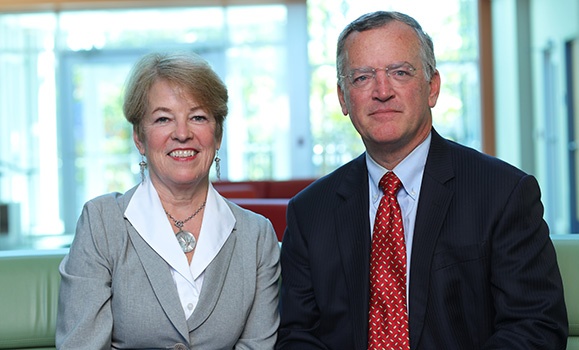One year ago, Dal held a big celebration to announce the creation of the Ocean Frontier Institute, an international hub for ocean science that brings together elite researchers and institutes to build understanding of our changing ocean and create safe, sustainable solutions for ocean development.
Ģż
A historic partnership between Dal, Memorial University of Newfoundland and the University of Prince Edward Island, OFI was made possible thanks to a $94-million grant from the Government of Canada through its Canada First Research Excellence Fund, as well as $125 million leveraged from private and public-sector partners including a $25 million investment by John Risley, co-founder of Clearwater Fine Foods.
From the archives: From world-class to world leading: Federal gov't announces $94-million investment in Dal-led Ocean Frontier Institute (Sept. 6, 2016)
While the launch was headline news across Canada āĢżwith significant media coverage and viral social media conversationā the one-year anniversary of OFI came without pomp or circumstance. There were no speeches. No media interviews. Not even a piece of cake.
āOur focus is on fulfilling the commitments we made and delivering on our promises,ā says Dr. Wendy Watson-Wright, CEO of OFI. āWe had our celebration. Now we need to produce results and show our partners that their investment is generating a significant return.ā
And that priority is rooted in research.
Sixteen research projects were reviewed by internal and external experts and many scientific teams are gearing up to begin their work. These projects, which represent the first phase of OFIās funding, include scientific analysis of the changing ocean ecosystems as well as studies to strengthen marine safety, ocean data and technology and the fishing and aquaculture industries.
Ģż
āOur inaugural year was a busy one and it wasnāt without its challenges,ā says Dr. Watson-Wright. āWe had our fair share of growing pains during the first year and at times our progress seemed slower than anyone wanted. But we now have a strong foundation on which to build.ā
The next priority for OFI is to advance ocean research through OFIās small seed and opportunities funds which have shorter time lines to completion. Engaging partners and collaborators on Phase two research opportunities is also high on OFIās to do list.ĢżĢż
Knowledge mobilization
Another OFI commitment includes acting as a catalyst to ensure its academic partners attract and retain world-leading research talent to Atlantic Canada.
Work is underway to eventually train more than 220 highly qualified personnel, advancing the regionās position as a leader in ocean-related teaching and learning. This includes the establishment of a Visiting Fellows Program, International Postdoctoral Fellow awards and Bilateral Graduate program. OFIās Faculty Program will bring 15 new faculty members to Dalhousie and 11 to the Memorial University of Newfoundland, all of whom will help advance OFIās research objectives well into the future. Ģż
OFI is also taking steps to strengthen access to infrastructure and technology that will advance ocean science. As part of this effort, OFI is constructing new research labs and offices in the Steele Ocean Sciences Building (expected completion 2019) and Memorial University (expected completion 2020) and identifying cost-effective ways to share access to ship time, in-water and analytical infrastructure.
āBy working together, we expect to reduce costs and accelerate the speed at which research is conducted,ā says Dr. Marlon Lewis, OFIās scientific director.
Prudent financial management and a business-style approach is key to OFIās structure, as the institute plans to transfer some of the research done in the universities to industry, putting it to work through incubator projects.
āOFI made a commitment that its research would deliver two very important goals ā providing the information that would influence the development of sound policy decisions and identifying ways in which we can advance our blue economy,ā says Dr. Lewis.
āOFIās one-year anniversary provides us with an opportunity to reflect on what weāve achieved, what weāve learned and what still needs to happen. It allows us to take stock of the ocean research deliverables that once we achieve, will really be worth celebrating.ā

